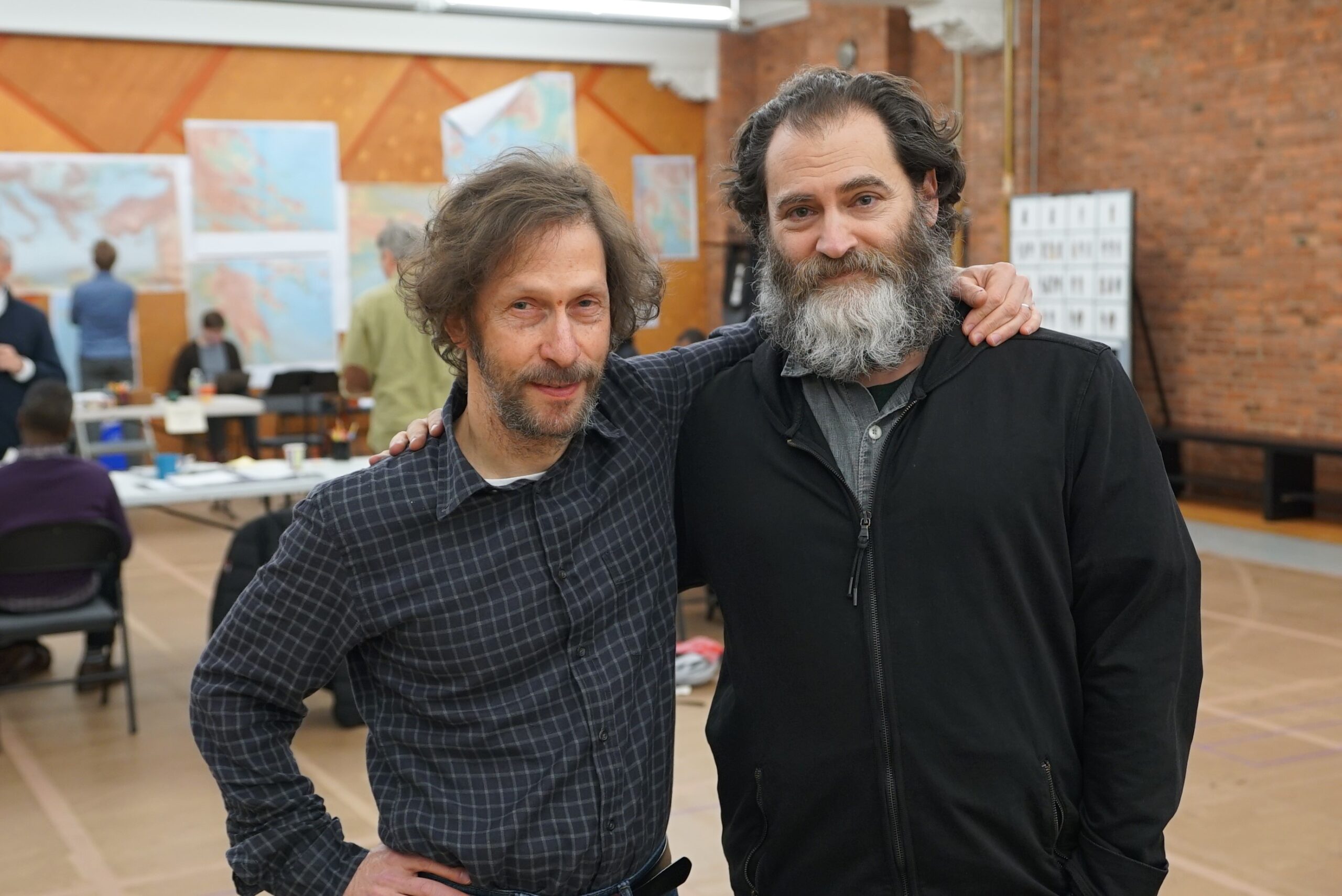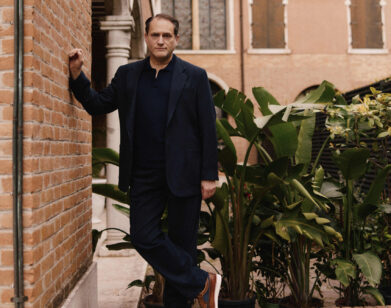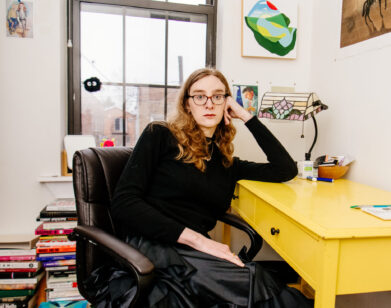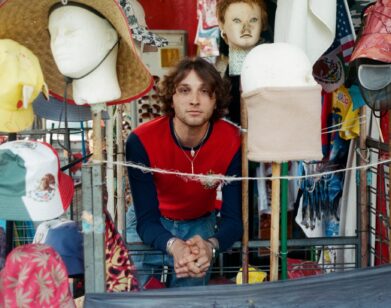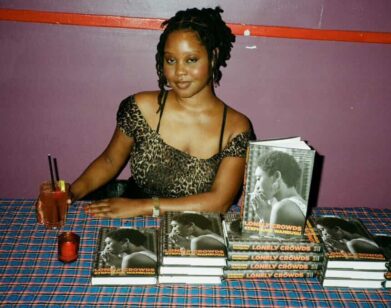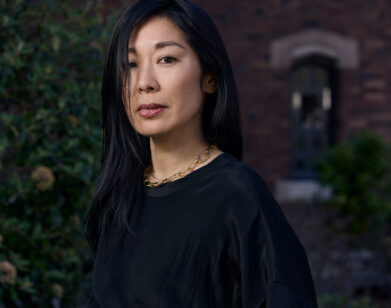IN CONVERSATION
Tim Blake Nelson and Michael Stuhlbarg Search for the Essential Truths
Tim Blake Nelson first caught Michael Stuhlbarg‘s eye three decades ago at Juilliard, where they both studied acting. “Ever since I met you at drama school back in 1988,” Stuhlbarg remarked in a Zoom call between the two last week, “you’ve always stood out from the crowd for me, not just as an individual doing what we were all doing at that time, but as someone who stepped outside of the box of actor training and was writing and directing their own projects.” Among a class of strivers just hoping to book their next gig, Stuhlbarg adds, “no one else at school was doing that.” One of the characteristically ambitious projects Nelson was working on at the time was a stage play about the life and death of Socrates, which he toyed with intermittently over thirty years before the production, starring Stuhlbarg in the titular role, debuted at New York’s Public Theatre in 2019. Now, Nelson, a scene-stealing regular in the films of Guillermo del Toro and Joel and Ethan Coen, returns with another feather in his cap: novelist. His debut novel, City of Blows, offers a panoramic view of the trials and tribulations of Tinseltown, following a director, producer, writer, and agent as they try to marshal a career-making film called Coal to its completion. To commemorate its publication, Nelson and his old friend and one-time muse got together to discuss how their approaches to acting have changed over the years, writing scripts vs. writing prose, and the advice Nelson received from Sam Shepard about the costs of autobiography.
———
MICHAEL STUHLBARG: Hey, Timmy.
TIM BLAKE NELSON: Michael!
STUHLBARG: How are ya?
NELSON: All right. You’ve grown your beard back.
STUHLBARG: Yeah, yeah. Being lazy.
NELSON: Being lazy?
STUHLBARG: Yeah.
NELSON: All right. Well, I think they’re already recording us, so whatever we say is going to be used against us.
STUHLBARG: Oh my goodness. I better sit up straight at least. Are you in Toronto?
NELSON: I am in Toronto. I’m in Hamilton.
STUHLBARG: Nice. How is it there?
NELSON: Well, it’s an interesting town, Hamilton. It was originally built as a banking center, and then it became an industrial center and an industrial port. And so, its initial intentions took something of a hit. But now, I think in the last five or six years, it’s having a revival because real estate is so expensive in Toronto. it’s really nice. I actually quite like it. I shot a bit of Nightmare Alley here. And then Guillermo del Toro’s Cabinet of Curiosities.
STUHLBARG: Right. You were wonderful in both of those.
NELSON: Oh, thanks Michael. As for you, in Shape of Water. We share Guillermo.
STUHLBARG: Indeed. Well, it’s a treat to see you always, and it was wonderful to see you a couple of weeks ago at the launch of your book. And I thank you for the lovely note you scribbled into my book that evening. I’m 300 pages into it and thoroughly enjoying it, and as always I’m captivated by your thinking, full of admiration for your humor, and baffled by how you continue to keep doing so many things all at one time. I scribbled down a bunch of notes as I went along and I thought I’d just throw some things out and maybe you can respond to them how you want to.
NELSON: I’d love that, but when it’s appropriate, I’m going to turn some stuff more into discussion between us because I’m just as much of an admirer of yours.
STUHLBARG: Well, ever since I met you at drama school back in 1988, you’ve always stood out from the crowd for me, not just as an individual doing what we were all doing at that time, but as someone who stepped outside of the box of actor training and was writing and directing their own projects. No one else at school at that time was doing that. Regardless of what the curriculum insisted, you were still asking questions and presenting new things that people could come see in the middle of our day in the drama theater. What I mean to say is that in some sense, you’ve always been a kind of beacon for me, full of acuity and specificity in terms of what you think I might want to do with my life or the directions I might want to go. Those who know you will be interested in how autobiographical this story is. I’ve had fun imagining who I’ve supposed certain characters to be. Things that I scribbled down here, like learning to swim or falling downstairs or Isaac saying, “I love you” to his son, Jacob. Were these autobiographical moments for you?
NELSON: Well, some of the stuff in there I’ve taken from my own life and most of it, not. It’s all a work of fiction. I think that, just like what you do in your performances and what I do in my performances as well, we grabbed from real life and there’s always the question how much are you going to do that. I’ve upset people in the past by doing it too much.
STUHLBARG: Interesting.
NELSON: And I don’t do that anymore. I was working on a movie in Alberta with Sam Shepherd and I asked him about this, and he effectively said, “You take whatever is there for you and you put it on the page if that’s what you want to do.” And I know Sam did that, particularly in some articles he wrote or some short stories, and it cost him, and that’s a cost I’m not interested in paying, personally. So I made great efforts in this novel to make its truths essential, which I think you have to do in prose. Obviously, anybody reading the book is going to infer that the character who went to Brown and Julliard is I, but at the same time he’s not because he does things in the novel that I’ve never done. He’s not from the city from which I hail. But turning it back on you a little bit, when I saw you play Aguecheek in Twelfth Night in Central Park, I think it’s probably my favorite live comic performance I’ve ever seen of a Shakespeare character.
STUHLBARG: Oh!
NELSON: You must have been using yourself, and with that character that meant a great deal of self-effacement. So I wonder what that process is for you.
STUHLBARG: Probably similar to yours, in that you recognize the things in yourself that are similar to the person you’re playing and you use them when they come in handy, but you also mix that with clues that the text gives you. In that instance, how I was going to look had already been dictated to me. So I had very little to do with any of the accouterments he wore, his top hat, his cane. So you find yourself in a position where you know what you’re going to look like, you put those things on, you start walking around in those three-and-a-half-inch high heel shoes and it makes you behave a particular way. And it’s the combination of all those elements, I think, that surprise us, because I hadn’t set out ahead of time knowing what it was going to be.
NELSON: I think that’s a very apt description, and it certainly applies to the way I wrote this book. And specifically with the character who at least on the outside is most similar to me. There’s stuff he does later in the novel that I would never do, and I feel like they’re informed by the subtle differences between him and me earlier in the novel when his biography is most similar to mine. I didn’t realize it at the time, but the decisions I was making that did depart from my own reality were later going to cause him to be quite different from me. Almost like that notion, if you’re building a skyscraper and you are half a degree off from perpendicular to the ground, it will make the building at a certain height an unsustainable edifice. And that was certainly true in finding the character.
STUHLBARG: Did you find the process of creating a novel similar or significantly different from the plays that you’ve constructed?
NELSON: Funnily enough, the writing of this novel was more informed by what I’ve learned as an actor over the years as I’ve tried simply to get better at it. So if I’ve gotten better, it’s because of scene partners I’ve had even more than some of the wonderful directors with whom I’ve gotten to work. So I think of a person like you, I think of watching Daniel Day-Lewis work, working with Sean Penn and John C. Reilly, I’ve just worked with Gretchen Mol on this movie. I mean, every interesting opportunity as an actor has improved me and what I’ve learned most of all, and this is very much informed by you and also Daniel Day-Lewis, is to take a gradual approach that assumes nothing and that delays choices for as long as possible so that those choices can be more informed and also strangely more intuitive rather than pre-planned. When I’d get a role, I’d immediately leap to, “This is the sound, this is the body, this is the rhythm of it.” And I would just grasp immediately for those anchors, but it caused the performances to be more shallow than I’d wished. And now I take an opposite approach. I almost don’t want to make the choices until the last possible moment, because they’re just going to be better, more informed, and the intuition is going to come from a deeper place and a deeper understanding of what it is I’m up to. When I went to write this novel, I let the characters develop in a way that was liberating for them by not deciding who and what they were immediately, letting them surprise me. And that’s why a lot of the book is centered around the backgrounds, the formative times in the character’s lives, in a way that you can only do in a novel. You can do background in a novel in a way that you can’t in other scripted narratives. I mean, does what I say ring true to you in terms of your approach?
STUHLBARG: My experience was very similar to yours. In fact, when I was at school, one of the critiques I received after one of the shows we did was, in essence, “You come to a part Michael, with a fully formed idea of what it should be, and it might be fine in and of itself. Ideas are good. However, it’s not until you interact with the other people on the stage that it will truly come to life.” And I think there was a part of me, and still even remains a part of me, that when you’re connecting with another person, it surprises me. It makes me laugh. It cracks open parts of myself that I wouldn’t know were there unless the other person was there. So I think the lesson I took from that example was: the ideas you bring to something are fine, but until you are in exchange with others, it won’t be fully alive because it won’t be in your head.
NELSON: I think that’s absolutely true, and it’s taken me a long time to learn it. I am also beginning to learn over the last five or six years that that also applies to the dialogue with the text itself, so that when I’m working on a part, the choices that I can’t help but start to consider as I read a script for the first time are not the choices I end up making.
STUHLBARG: Consciously?
NELSON: No, I just used to think those first choices are the best ones, because it’s intuition, it’s impulsive. And I used to believe that what you feel immediately on that first reading has more currency than anything else. I’m now to the point where it’s reversed. It was very valuable for me in the novel because I made no assumptions about what characters were going to do until they were making them. Now, this isn’t to say that in the writing of the book, I didn’t have an overall structure that was always ahead of the game. At a certain point, I knew how the novel was going to end and I always knew that certain characters were going to come into conflict. But the little choices they were making and how those impacted the central conflicts in the book were always surprising me. And that’s what acting has become for me. And it’s much more exciting to work this way. And I think it’s why Daniel spent so long on each role because he needed a deeper facility with the material in its entirety to start to make the most useful choices. It takes months of prep now to do a part, and that’s just better. And I’m so ashamed of the shallowness of my approach early on, and I think it’s reflected in some of my performances.
STUHLBARG: I don’t think there’s need for shame about it. I think we do what we can with the time we’re given. But yes, what a luxury it is to have all the time that you can muster to learn the entire arc of what the character is. I’m always desperate to have more time. And these days—
NELSON: Well, you’ve been working on “Your Honor,” where in television you’re not given that luxury. How do you confront that challenge and make it a positive thing rather than a negative thing? Because that’s what we got to do.
STUHLBARG: Right. In my experience, I try to utilize the time I’m given as thoroughly as possible to answer as many questions as I can going into it, and to know the scenes as thoroughly as possible. So I’m not thinking obviously about the words. I’m present on the day so that I can engage and try to remain open to all the different possibilities of what a scene could be. As I’m getting older, I’m starting to become more uncensored on a set and just offering my ideas up if I find that there seems to be an obstacle in the way.
NELSON: I remember on “Watchmen” coming in with this approach and realizing it was going to be something of an impediment if I were to apply it militantly. And not only that, I would just simply crash and burn because Damon Lindelof had told me early on, “I don’t know where your character is headed. You’re going to inform that with what you do in the first few episodes.” It’s the opposite of the kind of mastery I’m talking about, of knowing a script so intimately that your impulses surprise in all the right ways, because the assumptions I had were inevitably going to be toppled, and they really were. Episode five of “Watchmen” was devoted almost entirely to my character, and it completely upended the history with which I’d been working. Now, luckily, Damon was very sensitive to that and he chose a different route that ended up at the same destination. It all worked. There was no retroactive silliness where I would look back and say, “Oh my God. Well, that thing I did in episode two makes no sense now,” because I was dealing with a showrunner who was incredibly sensitive to this. So, why not go with the flow and look at that as a reason to do television, because it’s exercising a different kind of approach to the way you build a character? I’ve watched you do that on “Your Honor,” and it’s great.
STUHLBARG: It’s not been exactly the same kind of circumstance as what that sounds like. However, at the beginning of the season, we had a new showrunner and an entirely new writing room.
NELSON: Oh, interesting.
STUHLBARG: So I was faced with the circumstance of, “Okay, do we want to utilize at the beginning of a second season all the background information that I created about this guy initially? Or are we going to get together as a group and decide what a new background would be?” Our showrunner, Joey Hartstone, made a point of saying, “I really want to honor what you guys discovered last year.” So I basically had kept a Bible of all the ideas and background information of who I thought my guy was in the history of the family, and I gave it to them and they could see where I was coming from, and understood that perhaps some of the directions they had planned to go didn’t necessarily jibe with what I thought we had created. So it was a leap of faith. And I guess, as you’re saying, every day is a kind of leap of faith. And showing up, as they say in one of the old adages of our profession, is 90% of the job.
NELSON: Yeah. I think it was very helpful in writing City of Blows to apply that very adage. I showed up to write every day on this novel with a constantly deepening understanding of who each character was, and therefore they could all really lead me in telling the story.
STUHLBARG: Do you prefer the imagination to creating, I don’t know, stories based in truth or fact?
NELSON: Not to be coy, I don’t know what either of those words really means since everyone’s perception of what’s true is different. Yes, there are facts. I am alive, I’m not dead. But then what does the word alive mean? In certain cases, I’m not alive, I’m dead, I’m dying. If I’m dying, I’m alive, in some sense. Aspects of me are dead. So it’s all the imagination, including facts, and that’s not just mumbo jumbo. I really believe that to be true. Everything is a construct and everything is rhetoric, and that’s why we need stories. And those stories get us closer to sharing truths and believing in facts, but we ultimately never get there, as Tom Waits says.
STUHLBARG: Amen to that.
NELSON: Maybe we should end there. Do you want to continue this conversation on FaceTime, cause I’d like to catch up with you.
STUHLBARG: All right, I’d love that. Sure.

